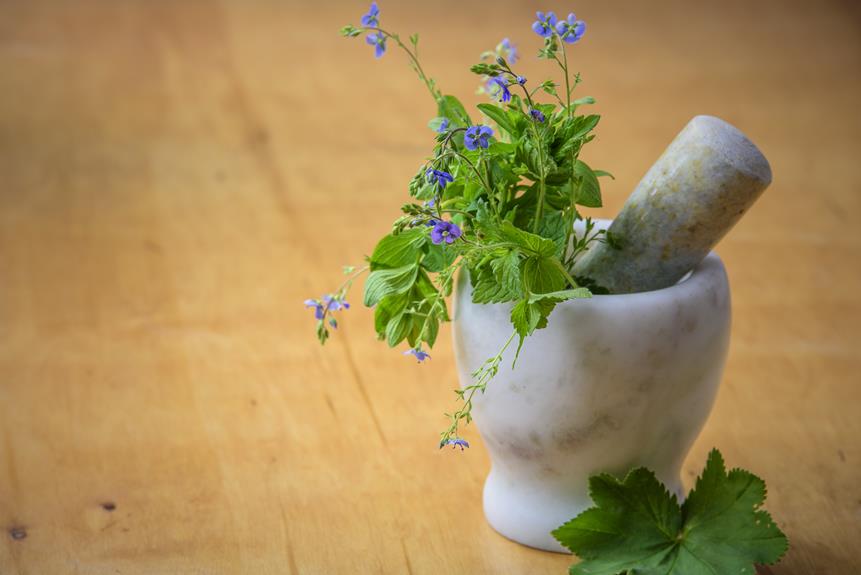You may be wondering why you should bother looking into the side effects of Kalmegh. After all, it's an herbal remedy with a long history of use in traditional medicine, so it must be safe, right? Wrong! Even herbal remedies can have side effects, and it's important to understand the risks before using this herb.
In this article, we'll explore the potential side effects of Kalmegh, as well as risk factors and ways to reduce these side effects. We'll also discuss when it's best to seek professional guidance.
What Is Kalmegh
You may be wondering what Kalmegh is. It's a plant native to India, with medicinal properties that have been used in traditional Ayurvedic medicine for centuries.
However, it can also be dangerous if taken in overdose, as it can lead to serious side effects. Its active compounds, alkaloids, are known for their anti-inflammatory and antipyretic properties, which can help reduce fever, swelling, and other illnesses.
However, it's important to use Kalmegh responsibly and to keep in mind the potential risks of its overdose danger.
Potential Side Effects of Kalmegh
You may want to be aware of the potential side effects of Kalmegh, as taking it in an overdose can cause serious issues.
Long-term use of Kalmegh may be linked to weakened immune systems, and liver damage.
It's important to monitor intake and consult medical professionals before taking it.
Make sure to get informed about any possible risks associated with taking Kalmegh, and take steps to ensure your safety and well-being.
Understanding Risk Factors of Kalmegh
It's important to understand the risk factors associated with Kalmegh before taking it, so you can both monitor intake and consult medical professionals.
Here are some key takeaways to consider:
- Overdosing can be a serious health hazard.
- Make sure to monitor other herbal interactions.
- Be aware of potential side effects.
- Take precautions to ensure safety.
Do your research and speak with a healthcare provider to ensure you take Kalmegh responsibly.
How to Reduce Side Effects of Kalmegh
In order to reduce the potential side effects of Kalmegh, you should both research and consult with a healthcare provider. Avoid usage if you have a known susceptibility to the side effects. If usage is necessary, ensure that proper dosage is followed. Otherwise, the side effects can be severe and long lasting.
To stay safe, read the warnings and instructions for usage, and talk to your doctor about any concerns. Be informed and liberated from the risks of Kalmegh.
Seeking Professional Guidance for Kalmegh Use
For those considering taking Kalmegh, seeking professional guidance is a must, and can help ensure safe and effective usage. There are many benefits to this:
- Professional advice on dosage
- Guidance on avoiding adverse reactions
- Access to resources to manage side effects
- Support to ensure optimal benefits and safety
Frequently Asked Questions
What Are the Long-Term Effects of Kalmegh Use?
Using kalmegh long-term can affect mental health and weaken the immune system. Be aware of these potential impacts and seek help if needed. Liberate yourself from any negative side effects.
Is Kalmegh Safe for Pregnant or Nursing Women?
You shouldn't take any herbal remedies, like kalmegh, while pregnant or nursing. Possible side effects may impact both mom and baby, so consult your doctor before use. Though it may seem like a natural solution, it's best to stay on the safe side.
Are There Any Interactions Between Kalmegh and Other Medications?
Yes, kalmegh can interact with other medications and dosage recommendations should be consulted to avoid potential risks. Make sure to inform your doctor of any medications you are taking before starting kalmegh.
How Quickly Do the Side Effects of Kalmegh Typically Appear?
Symptom management is key. Adverse reactions of kalmegh can appear quickly. Be aware of your body and any changes. Stay vigilant for signs of side effects.
Are There Any Natural Alternatives to Kalmegh for Treating My Condition?
Yes! Around 80% of people with chronic conditions find relief with alternative therapies and diet changes. Explore natural options to reduce your symptoms and improve your quality of life.
Conclusion
By understanding the potential side effects of kalmegh, as well as the risk factors associated with it, you can help reduce any negative repercussions of its use.
However, it's important to remember that everyone's body is unique, and to seek professional guidance when considering kalmegh as a supplement.
Don't risk your health – take the necessary precautions and use kalmegh responsibly.






